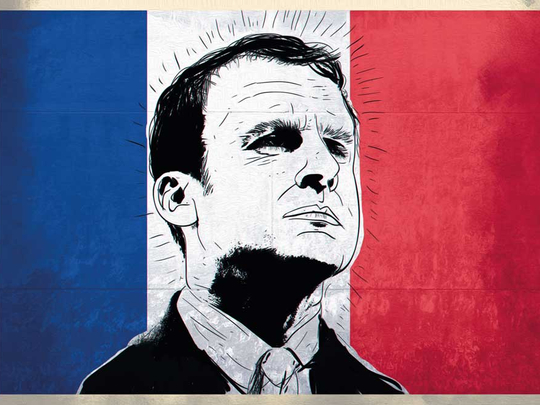
France’s boyish president already has faced down United States President Donald Trump, lectured Russian President Vladimir Putin and confronted the formidable French labour unions — all in less than three weeks.
Seeking to shatter any doubts about his youthfulness and inexperience, President Emmanuel Macron, 39, has shown himself punchier and more decisive than the bland candidate he evoked in the campaign. And he is doing it without notes.
Last week, he outshook Trump’s hand at the Group of 7 summit meeting. On Monday, in a slap at Russia, he put visiting Putin on notice over Syria and propaganda assaults from Kremlin-allied media.
Macron has politely but firmly challenged France’s unions about changing what he regards as France’s job-killing labour code, the most ambitious part of his domestic agenda.
He has given fits to France’s established parties on the Right and the Left, poaching personalities for his government from the first and advancing a Socialist-unfriendly agenda destabilising to the second. Improbably, he will most likely win a parliamentary majority in this month’s elections, though sceptics doubted he could even assemble enough candidates for his new party.
The early impression is a marked contrast to the downbeat, relatively informal style of his predecessor, Francois Hollande, derided for his “little jokes”, chattiness with the media and desire to be a “normal” president. Macron is not chatty, keeps the media at a distance, does not tell jokes and is anything but a “normal” politician, or president.
Instead, he came close to humiliating Putin to his face, about chemical weapons in Syria last Monday, in the deliberately chosen grandiose setting of Versailles. In the news conference last Saturday after the G-7 meeting in Sicily, he spoke fluently and off-the-cuff on topics like Libya and African development, without Hollande’s customary hems, haws and little smiles.
Macron projected assertiveness, telling reporters, for instance, that he had insisted to Trump how “indispensable” it was for “America’s reputation” that he stick to the Paris climate agreement.
Otherwise, Macron’s public declarations have been sparse.
“It’s been very presidential. You can see him totally assuming the job, the verticality of the job” — the French presidency as a top-down operation, with the man at the top giving the orders — “and putting a certain distance between himself and the press”, said Laurent Bouvet, a political scientist at the University of Versailles.
“You can also see it in the stage-setting of the presidency — the night of his election,” when Macron spoke from the great courtyard of the Louvre, “and in the reception of Putin” at Versailles in a grand hall celebrating French military triumphs, Bouvet continued.
Both settings are intimately associated with France’s ancient monarchy. “He’s not hesitating at all to stage-set the majesty of presidential power,” Bouvet said. That aura of authority is partly a response to the menacing international context Macron repeatedly referred to during the campaign, with France and its partner Germany threatened on two sides by unpredictable behemoths of uncertain attachment to European values, Russia and Trump’s America.
But it is also a function of Macron’s deeply held belief that France in some sense has been missing its king since the execution of Louis XVI on January 21, 1793, and that his job is to fill the gap.
In an interview two years ago, Macron made a statement about France’s absent king that is still the subject of shocked commentary. “In the process and function of democracy there is something missing, the figure of the king, whose death, I believe, fundamentally, the people did not want,” Macron told the weekly newspaper Le 1, saying it “created an emotional void”.
In France, no politician outside the circle of fringe far-right royalists is supposed to talk about missing the king. That form of nostalgia is taboo for anybody who professes attachment to Republican values.
Yet, the view encapsulates both his regal view of power — offset somewhat by the slight youthful figure he presents — and his love of paradox, combining the concepts of monarchy and democracy.
Macron’s most celebrated catchphrase in his speeches reflects that love. “And at the same time,” Macron often says — so much so that the crowds began to laugh when he pronounced it during the campaign. Commentators have traced that desire on Macron’s part — to juggle two opposing viewpoints at once — to his early philosophical training as an assistant to one of France’s most celebrated 20th-century philosophers, Paul Ricoeur, who died in 2005.
Ricoeur’s work, the newspaper Le Monde most recently pointed out, is shot through with apparent paradoxes, which in reality expressed a kind of civilising wish to find a middle ground. Macron was his research assistant as a university student at the end of the 1990s.
In French politics, sharply divided on ideological lines between Right and Left, the tendency has been difficult for Macron’s opponents to digest. Yet, it has allowed him to siphon off large numbers of centrist political figures who do not see themselves represented in the old parties.
It also allowed him to find a glimmer of hope in his discussions with Trump. Last Saturday, he acknowledged the wide differences between Trump and the other members of the G-7 on the Paris climate accords. But at the same time, as Macron might say, “I took note of his willingness to listen and of his desire to make progress with us,” the French president said at his news conference, calling Trump “pragmatic”. That was a markedly less pessimistic view of the American president than that of Chancellor Angela Merkel of Germany, who suggested that Europe could no longer count on the US as a solid ally.
— New York Times News Service
Adam Nossiter has been a Paris correspondent for the New York Times since July 2015.











